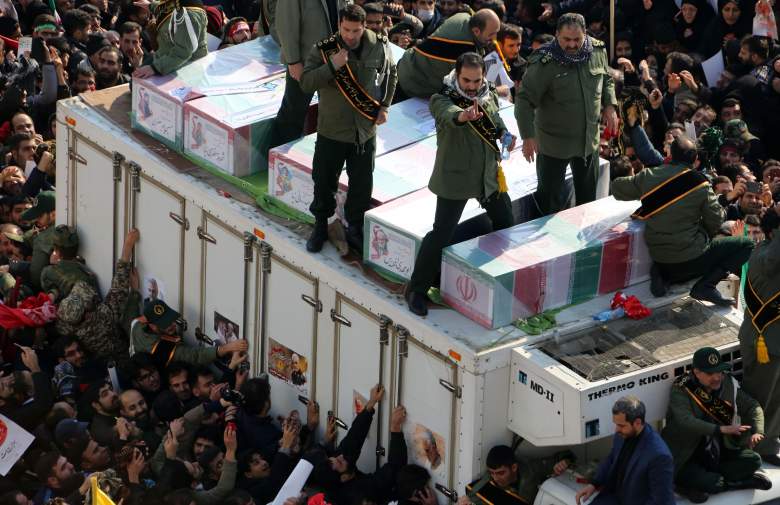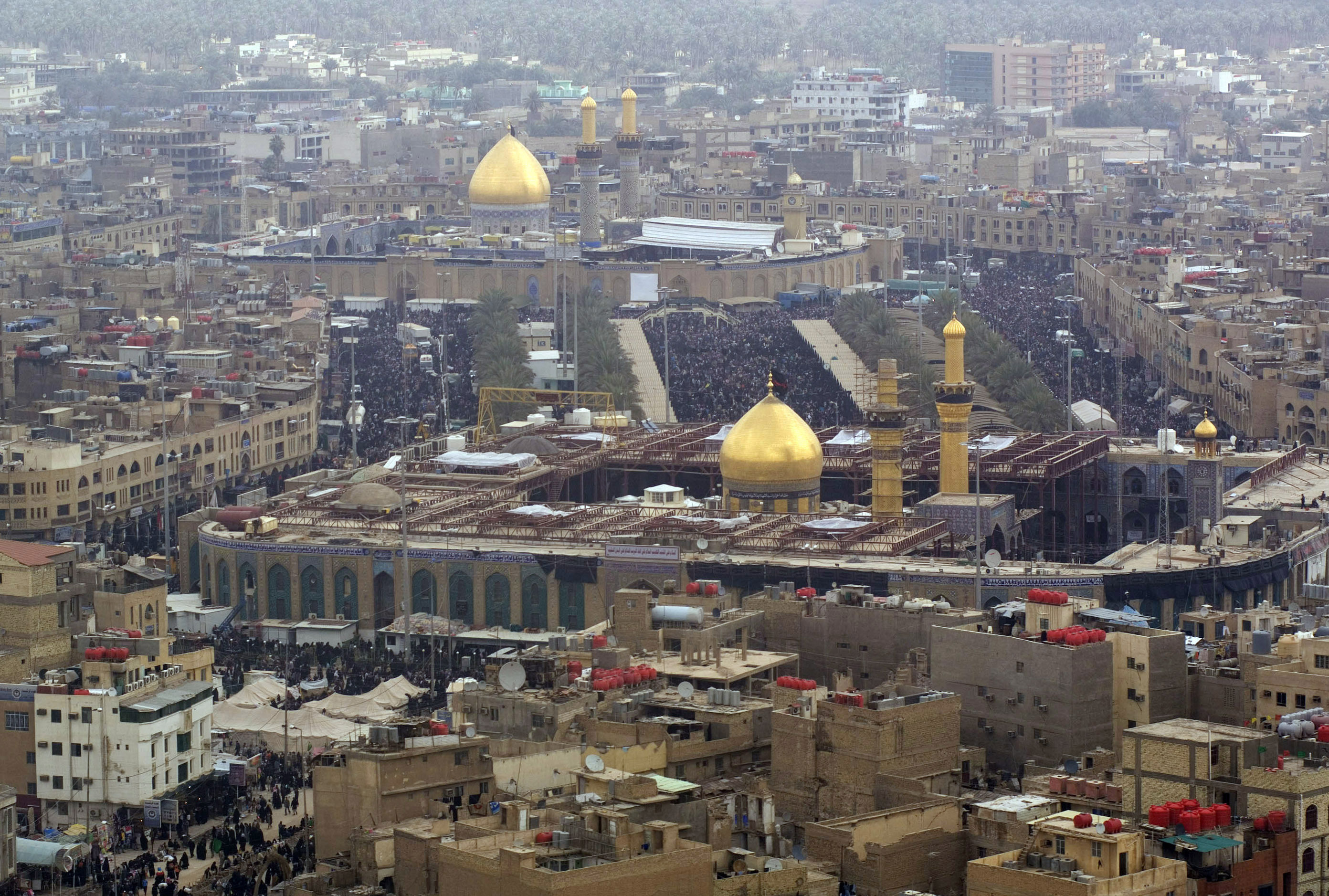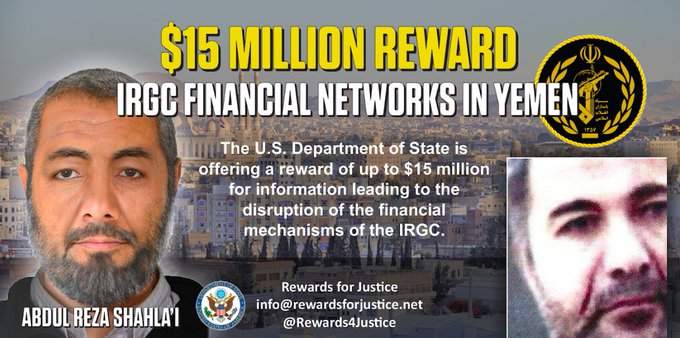
Abdul Reza Shahlai is a top commander with the Iranian Revolutionary Guard’s elite Quds Force. He was targeted by a U.S. military strike in Yemen on Jan. 1, the same day that a U.S. drone strike in Iraq killed Qasem Soleimani, a top general of the Quds Force, according to the Washington Post.
Shahlai has helped finance the war in Yemen and U.S. officials say he is responsible for a deadly 2007 attack against U.S. forces in Iraq that left five American soldiers dead. In December, the State Department offered up to $15 million for information about Shahlai’s finances and contacts.
Here’s what you need to know.
1. The U.S. Military Targeted Abdul Reza Shahlai on the Same Night Qusam Soleimani Was Killed in a Drone Strike in Baghdad
Abdul Reza Shahlai, a top commander with the Iranian Revolutionary Guard’s elite Quds Force, was targeted by a U.S. military strike in Yemen on Jan. 1, the same day that a U.S. drone strike in Iraq killed Qasem Soleimani, another top general of the Quds Force, according to The Washington Post.
“The strike targeting Abdul Reza Shahlai, a financier and key commander of Iran’s elite Quds Force who has been active in Yemen, did not result in his death, according to four U.S. officials familiar with the matter,” the Post reported.
The failed strike left some politicians and experts wondering if it is part of a larger mission to eliminate top Iranian officials.
“This suggests a mission with a longer planning horizon and a larger objective, and it really does call into question why there was an attempt to explain this publicly on the basis of an imminent threat,” Suzanne Maloney, an Iran scholar at the Brookings Institution, told the Washington Post.
Rep. Ro Khanna, a Democrat from California, tweeted: “Congress needs answers.”
2. Abdul Reza Shahlai Is Responsible For a 2007 Attack in Karbala, Iraq That Killed 5 U.S. Soldiers

Hundreds of thousands of Shi’a and Sunni Muslims make a pilgrimage to the city of Karbala, Iraq to participate in the observance of the Arba’een religious holiday on Feb. 27, 2008. U.S. Navy Photo
U.S. officials say Abdul Reza Shahlai is responsible for a 2007 ambush on U.S. troops in Karbala, Iraq, that killed 5 U.S. soldiers and wounding three others.
According to Defense Department officials, on Jan. 20, 2007, insurgents wearing “U.S. Army-style uniforms” and carrying “U.S.-type weapons” attacked the Provincial Joint Coordination Center in Karbala, Iraq, about 30 miles south of Baghdad.
At about 5 p.m. that day, a convoy consisting of at least five sport utility vehicles entered the Karbala compound and about 12 armed militants attacked the American troops with rifle fire and hand grenades, officials said.
One soldier was killed and three others wounded by a hand grenade thrown into the center’s main office. Other explosions within the compound destroyed three Humvees.
The attackers withdrew with four captured U.S. soldiers and drove out of the Karbala province into the neighboring Babil province. Iraqi police began trailing the assailants after they drew suspicion at a checkpoint.
Three soldiers were found dead and one fatally wounded, along with five abandoned vehicles, near the town of Mahawil. Two were found handcuffed together in the back of one of the vehicles. The other two were found nearby on the ground. One soldier was found alive but died en route to a nearby hospital. All suffered from gunshot wounds.
“The precision of the attack, the equipment used and the possible use of explosives to destroy the military vehicles in the compound suggests that the attack was well rehearsed prior to execution,” said Army Lt. Col. Scott Bleichwehl, spokesman for Multinational Division Baghdad, said at the time. “The attackers went straight to where Americans were located in the provincial government facility, bypassing the Iraqi police in the compound.”
3. In December 2019, the State Department Offered $15 Million For Any Information on Abdul Reza Shahlai’s Finances
Special Representative for Iran and Senior Advisor to the Secretary of State Brian Hook announced on Dec. 5, 2019, that the U.S. government is offering up to $15 million for information “for information on the financial activities, networks and associates of Abdul Reza Shahlai.”
The money was offered through the State Department’s Rewards for Justice program.
“He is a Yemen-based high-ranking commander of the IRGC’s Quds Force,” Hook said during a State Department briefing. This is a part of the Rewards for Justice program for information leading to the disruption of IRGC operations. Shahlai has a long history of attacks against Americans and our allies globally. He planned multiple assassinations of coalition forces in Iraq, provided weapons and explosives to violent Shia extremist groups and planned the Jan. 20, 2007 attack in Karbala that killed five American soldiers and wounded three others.”
In 2011, Shahlai funded and directed a plot to assassinate the Saudi ambassador to the United States, Adel al-Jubeir. This would have been carried out in a restaurant in Georgetown [in Washington, D.C.],” Hook said. “Shahlai also aimed to carry out follow-on attacks in the United States and elsewhere. Had this scheme succeeded, as many as 200 innocent civilians in the United States could have been killed.”
“Given Shahlai’s track record of terrorism and destabilization in Iraq, we remain gravely concerned by his presence in Yemen and potential role in providing advanced weaponry of the kind that we have intradicted to the Houthis. Iranian UAVs, missile and explosive boats have been used by the Houthis to threaten key civilian and economic interests and otherwise wreak havoc on the nation,” Hook said.
“Iran is trying to prolong Yemen’s civil war to project power,” Hook said. “Iran should follow the calls of its own people and end its involvement in Yemen. The Yemeni people have suffered far too long and Iran has no legitimate interest in Yemen.”
4. U.S. Officials Say Abdul Reza Shahlai Is Based in Sanaa, Yemen, and Is Also Known As ‘Hajji Yusef’
According to the State Department, Abdul Reza Shahlai is a financier based in Sanaa, Yemen and a commander in the Iranian Revolutionary Guard’s Quds Force. He was born in Iran circa 1957 and he is also known as Hajji Yusef.
Anyone with information about Abdul Reza Shahlai, is asked to contact the nearest U.S. Embassy or Consulate or email info@rewardsforjustice.net. All information will be kept strictly confidential.
In 2011, Shahlai was named by the Treasury Department as one of “five individuals, including four senior Islamic Revolutionary Guard Corps-Qods Force (IRGC-QF) officers connected to a plot to assassinate the Saudi Arabian Ambassador to the United States Adel Al-Jubeir, while he was in the United States and to carry out follow-on attacks against other countries’ interests inside the United States and in another country. As part of today’s action, Treasury also designated the individual responsible for arranging the assassination plot on behalf of the IRGC-QF.”
The five men were sanctioned and “U.S. persons are prohibited from engaging in transactions with these individuals, and any assets they may hold in the U.S. are frozen.”
“Iran once again has used the Qods Force and the international financial system to pursue an act of international terrorism, this time aimed against a Saudi diplomat,” David Cohen, Under Secretary for Terrorism and Financial Intelligence, said at the time. “The financial transactions at the heart of this plot lay bare the risk that banks and other institutions face in doing business with Iran.”
5. The United States Imposed Additional Sanctions on Iran Amid Heightened Tensions Between the Two Nations
On Friday, Secretary of State Mike Pompeo and Treasury Secretary Steven Mnuchin announced a fresh set of sanctions on Iran as the two countries were at the brink of war over the death of Qasem Soleimani, the top Quds Force general who was killed by a U.S. drone strike in Baghdad, Iraq, on Jan. 1. Iran responded by launching ballistic missiles at Al-Asad Air Base in western Iraq, where U.S. troops are deployed. U.S. officials said no Americans were hurt or killed in the attack.
The sanctions target “eight senior Iranian regime officials who have advanced the regime’s destabilizing objectives, as well as the largest steel, aluminum, copper, and iron manufacturers in Iran, who collectively generate billions of dollars annually,” the Treasury Department said in a press release. It also placed sanctions “against persons operating in or transacting with additional sectors of the Iranian economy, including construction, mining, manufacturing, and textiles.”
“The United States is targeting senior Iranian officials for their involvement and complicity in Tuesday’s ballistic missile strikes,” Mnuchin said. “We are also designating Iran’s largest metals manufacturers, and imposing sanctions on new sectors of the Iranian economy including construction, manufacturing, and mining. These sanctions will continue until the regime stops the funding of global terrorism and commits to never having nuclear weapons.”

